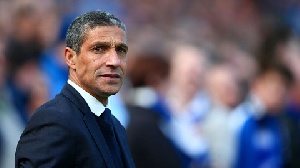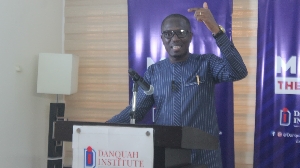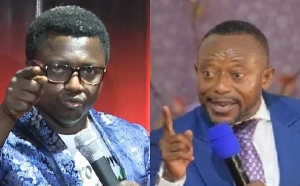- Home - News
- TWI News | TV
- Polls
- Year In Review
- News Archive
- Crime & Punishment
- Politics
- Regional
- Editorial
- Health
- Ghanaians Abroad
- Tabloid
- Africa
- Religion
- Election 2020
- Coronavirus
- News Videos | TV
- Photo Archives
- News Headlines
- Press Release
Opinions of Tuesday, 10 February 2015
Columnist: Ametor-Quarmyne, E. M. N.
The canonization of a traitor
By : e m n Ametor-Quarmyne
The remembrance of a relative, a friend, a countryman or even a sworn foe is often a activity carried out in Ghana and I believe in many other countries the world over. What is important is that speeches, orations and adorations that often accompany such a celebration or commemoration must be honest and factual, for, many are those who would have been hearing of such a person being remembered for the first time, or if they had, may not have known his or her life’s story.
On 4th February, 2015, just about a week ago the relatives of Dr. James Boakye Danquah led by Nana Addo Dankwa Akufo-Addo the Presidential Candidate of the New Patriotic Party(NPP), organized a public lecture as one of the activities lined up to commemorate the 50th anniversary of the death of one of the leaders of the Gold Coast, as Ghana was then known and who history recognizes as among those who played a leading role in the politics of their time. Together with other greats of our past such as Osagyefo Dr. Kwame Nkrumah of blessed memory, who became the first Prime Minster of Ghana and then the first President of independent Ghana, Paa Grant credited with the formation of the United Gold Coast Convention(UGCC) the first truly national political movement, Komla Agbeli Gbedema. Ako Adjei, Krobo Edusei, Kojo Botsio, Kofi Baako, Dr. Kofi Abrefa Busia and many more among others, they brazed the trail that led to the creation and nurturing of the nation state we now know and call Ghana.
However, the commemoration lecture delivered by Nana Akufo-Addo has tended to incur the displeasure of a section of the Ghanaian political class and it is seen largely as a sort of falsification of history. The whole lecture could be summed up as the canonization of J. B. Danquah and vilification of Dr. Kwame Nkrumah. The two men in their life time were seen as bitter political rivals having been on the opposite sides of the political divide, the bitterest being the contest for the Presidency of the nascent republic in 1960 which Dr. Nkrumah won most convincingly. Events after 1960 led to the passage of the Preventive Detention Act(PDA) designed to keep at bay dissident elements within the opposition parties whose perpetuation of violence threatened the stability of the newly born state. That legislation enabled Dr. Danquah to be detained without trial on a number of occasions one of which ended in his death on 4th February, 1965 at the NSAWAM medium security prison.
Without a proper knowledge of our immediate post independence political history, Nana Akufo-Addo’s lecture could be most misleading, which is the reason why many Ghanaians particularly those of Nkrumah’s Convention Peoples Party persuasion and indeed most fair minded Ghanaians are of the opinion that, that lecture did more harm than any good to nurturing an atmosphere of cordial inter-party relations which condition is direly needed for the coming 2016 elections.
It might serve a good purpose to quote a couple of paragraphs from the speech delivered by Nana Akufo-Addo to illustrate this point.
“Eventhough Danquah never exercised executive authority in the state, his influence on Ghanaian history has been truly astonishing and can be felt in virtually all areas of our national life – constitutional, cultural, economic, intellectual, political, and religious. Several key institutions of our country owe their origin directly to his work- Cocoa Marketing Board; the University of Ghana, Legon; the Kwame Nkrumah University of Science and Technology, Kumasi; the Bank of Ghana; Ghana Commercial Bank; and Accra Sports stadium amongst others”. These proclamations were made without any detailed provision of any direct roles which he played to facilitate their creation.
But a simple search of our archives would reveal that the institutions listed above by Nana Akufo-Addo do not owe their existence to the singular work of Dr. J. B. Danquah as the NPP presidential candidate would have the world believe. Dr. J.B. Danquah by the fact that he was one of the few persons in the Gold Coast at the time who were educated and again by the fact that his brother was Nana Sir Ofori Atta 1st the Okyenhene at the time, who had struck a particularly close friendship and working relationship with the colonial administration, was able to find himself a part of the Legislative Council established by the British as an instrument of their indirect rule in the Gold Coast. It is in this vein that the contributions of Danquah to our nation must be properly situated.
For example, when Nana Akufo-Addo quoted Dr. Danquah’s question to the then Colonial Secretary during a Legislative Council meeting of 17th September 1947, thus, “ Dr. Danquah: Would Government consider the appointment of a national committee to enquire into the possibilities of a Volta Basin Corporation to develop the resources of the river for light, water and power, and to exploit for public benefit the vast mineral resources of the Volta Basin?, he was merely wanting to know whether government would set up a committee to go into the subject.
How a mere question to the Colonial Secretary could now be termed a spectacular dream and vision of Danquah must be interesting indeed. The potentials of the Volta River and its basin for development into a hydroelectric power had long been known and considered by the colonial administration as far back as 1915, long before Danquah posed that question in 1947. Indeed it had been on the agenda of the Germans who colonized that area we now call the Volta region of Ghana before the events of the 1st world war of 1914-1918 which resulted in the defeat of the Germans and the taking away of their African territories from them by the British and the French. It is such attempts at falsification of facts which is reprehensible for a lot of Ghanaians who know our history.
But the most disturbing part of Nana Akufo-Addo’s lecture was his attempt to blame Dr. Nkrumah for the unfortunate death of Dr. J. B. Danquah in 1965. Hear him, “It is time that we moved on from the understandable bitterness that continues to fill the hearts of many who love his work and contribution because of the cruel circumstances of his death. Let me, on behalf of lovers of Danquah, especially his family of which I am proud to be one, use this occasion, which commemorates the 5oth anniversary of his tragic death, to forego all feelings of bitterness and to say unreservedly to Kwame Nkrumah, his family and his supporters that we forgive what took place on that day.”
The tragic circumstances of Dr. J.B. Danquah’s death unfortunate as they were, could not and should not be blamed on Dr. Nkrumah as Nana Akufo-Addo had sought to do on the 50th anniversary of his death. There are abundant materials available both here in Ghana and in international circles to fully implicate Dr. Danquah and his ilk of the then United Party(UP) now New Patriotic Party(NPP) in the numerous assassination attempts on the life and person of Osagyefo Dr. Kwame Nkrumah, and the coup d’etat that finally led to his overthrow on 24th February, 1966.
Even though Dr. Kwame Nkrumah and his Convention Peoples Party (CPP) had won all the elections held by the British colonial administration that led finally to the independence of Ghana in 1957, Dr. J. B. Danquah and the opposition tacitly refused to accept and to recognize the legitimacy of Nkrumah and the CPP’s victories. Soon after independence the opposition formed themselves into terrorist organizations domiciled in Lome, Togo and began to wreck havoc on the infant nation through violence perpetuated through bombings and grenade throwing at political rallies and mass gatherings. They had only one aim. To make the young nation ungovernable. Dr. Nkrumah and the CPP had no option than to use their majority in Parliament at the time to pass a law which allowed the detention of those terrorist elements without trial. The now well known Preventive Detention Act(PDA). It is noteworthy to point out here that similar legislation was used in Kenya by the British during the Mau Mau agitations in that country without the criticism that accompanied the introduction of the same law in Ghana.
Specific attempts were made on the life and person of Dr. Kwame Nkrumah to assassinate him, most of which failed. The most brazen were the Kulungugu incident of 1962, and the Constable Ametewee,s personal attack on Nkrumah at the Flagstaff House in 1965. Looking back, I wonder if any President or Head of State could have had the heart and strength of mind to withstand the ordeal which Nkrumah went through without taking steps to safeguard his own life. It is even more remarkable to note that the errant constable was never tried for his assassination attempt on Dr. Kwame Nkrumah. Instead, he was tried and convicted for the murder of Superintendent Salifu Dagarti, a senior Police Officer in Nkrumah’s security set up who he shot dead in his assassination attempt on Nkrumah. Nkrumah was magnanimous enough to commit to life imprisonment almost those conspirators who were tried and sentenced to death for various terrorist activities in Ghana at the time. As for those who were detained under the PDA they were granted reprieve from time to time.
But perhaps the most startling thing about J.B. Danquah was the revelation that he collaborated with the Central Intelligence Agency(CIA) of the United States of America in their efforts to either assassinate or overthrow Dr. Kwame Nkrumah and his government. These facts have come to light due to the declassification of sensitive documents of the CIA and the State Department(Ministry of Foreign Affairs) of the United States of America, which have been made public, as well as other sources such as books written by insiders of the American regime at the time. In his book “JFK : Ordeal In Africa”, Mr. J. Mahoney had this to say of Dr. J B Danquah. “Ambassador Mahomey was soon to find out, however, what careerists normally prefer to ignore by instinct and what political appointees usually fail to grasp through innocence, that an ambassador is seldom the master of his own house.”
The matter concerned J. B. Danquah, Nkrumah’s opponent in the presidential elections of 1960, who had been released from prison a few months after Mahoney’s arrival as ambassador. Danquah paid a visit one November day to the embassy to ask Mahoney why the funds his family had been receiving during his imprisonment had been cut off after his release. This was the first time that Mahoney had heard of the arrangement. After Danquah left, he summoned the CIA Chief of station to ask why he had not been advised of the agency’s association with Danquah.”
Isn’t it surprising or even disgraceful and repugnant that a man such as J. B. Danquah whose death 50years ago was celebrated with such pump and was reputed to be a leading light and politician in the Gold Coast, who stood for the coveted office of President of this nation should stoop so low as to be in the pay of the secret services of a foreign power in the quest of assassinating the President of the nation and or overthrowing the legitimate government of his own country?
In conclusion, I can only quote Dr. Kwame Botwe-Asamoah, a Ghanaian Professor of African and African American History at the University of Pittsburgh, USA, in his article “ The Fallacies of J.B. Danquah’s Heroic Legacy.” Hear him, “ it is one thing adoring one’s kin/or mentor regardless of his or her nefarious deeds and treasonable acts, and it is another thing trying to impose such and individual on a nation as a hero.” And I agree entirely with Dr. Kwame Botwe-Asamoah that “indeed, imposing Dr. J. B. Danquah on the nation as a compatriot saint” is not only a mockery of our sensibilities but also an insult to our intelligence as a people who know their history.










